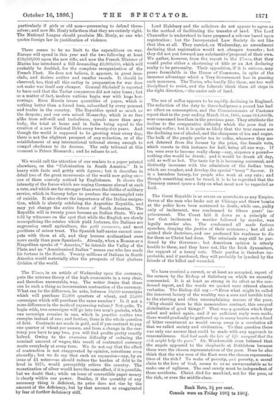The Times, in an article of Wednesday upon the currency,
puts the extreme theory of the high economists in a very clear, and therefore answerable, way. The writer denies that there can be such a thing as inconvenient contraction of the currency. What can be the difference, he asks, between 50,000 sovereigns which will purchase 25,000 quarters of wheat, and 25,000 sovereigns which will purchase the same number ? Is it not a mere difference in the mode of expressing values P Not quite. To begin with, two sovereigns will go into two men's pockets, while one sovereign remains in one, which in practice excites two energies instead of one; and further, there is the whole question of debt. Contracts are made in gold, and if you contract to pay one quarter of wheat per annum, and from a change in the cur- rency you have to pay two, you will find profits pretty exactly halved. Owing to the excessive difficulty of reducing the nominal amount of wages, this result of contracted currency meets everybody at every turn. We do not say that the effect of contraction is not exaggerated by opinion, sometimes even absurdly ; but we do say that such an expansion—say, by an issue of 21 notes—as should reduce the burden of debt to its level in 1875, would perceptibly relieve the country. The monetisation of silver would have the same effect, if it is possible, but we doubt that ; while an issue of convertible paper money is clearly within our power. Besides, if the quantity of any necessary thing is deficient, its price does not rise by the amount of the deficiency, but by that amount as exaggerated by fear of further deficiency still.


































 Previous page
Previous page